Beyond books, a library's personality is defined by patrons
During this year’s Shanghai International Film Festival in June, I watched the documentary “Ex Libris: The New York Public Library,” filmed by Frederick Wiseman.
In the film, Francine Houben, creative director of Dutch architectural firm Mecanoo, which is leading the renovation of the Mid-Manhattan Library, says libraries are not about books or their storage, but about people.
That got me to thinking that libraries, like neighborhoods, are communities of interest.
I was reminded of some of the people I have seen and met at Shanghai Library: the middle-aged man staring at a computer all day watching stock market quotes; the man who quit his job to write a novel; the old man who always carried a shabby recycled bag and used a magnifying glass to read and take notes.
The present-day Shanghai Library, located on Huaihai Road M. in Xuhui District, opened to the public in December 1996, replacing an older building on Nanjing Road W.

Shanghai Library has created a welcoming atmosphere to encourage people to read, think and learn.

"The Thinker" sits in front of Shanghai Library.

“I have lived in the area all my life and started to visit Shanghai Library when it first opened,” said a 69-year-old woman surnamed Feng, who comes about three times a week. “This location once housed a diary factory, and I can recall the odor and mooing of cows when walking by.”
A library, in a sense, is a tribute to the pursuit of knowledge. Shanghai Library has created a welcoming atmosphere to encourage people to read, think, learn and strive.
A copy of the famous Rodin bronze sculpture “The Thinker” stands in front of the building to remind us of the library’s core essence.
The grand staircases that leads up to the front entrance creates a sense of solemnity, and the palace-like grandeur of the building makes knowledge seem all that more precious.
“I enjoy the pleasure of finding books, and I love being surrounded by books,” said Li Jiacheng, a Henan Province native who begins sociology studies at Peking University next month. “I can lose myself in the ocean of books and I know people who come here are well-mannered.”
Sitting next to me, he was somewhat surprisingly reading the constitution of the People’s Republic of China.
“I leave for the United States tomorrow on a cultural-exchange program,” he told me. “I am doing preparation for the trip. In my three days in Shanghai, I have spent two of them in the library.”

It is also a captivating place for people-watching.
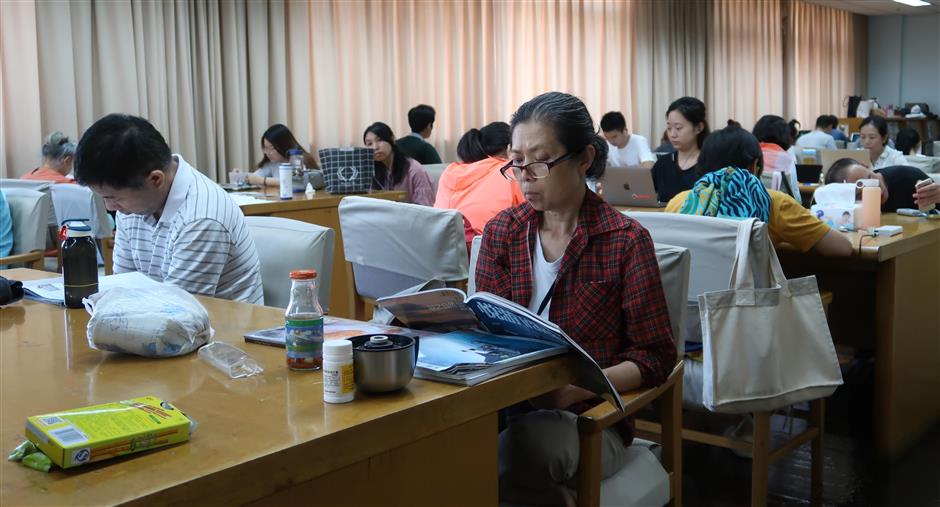

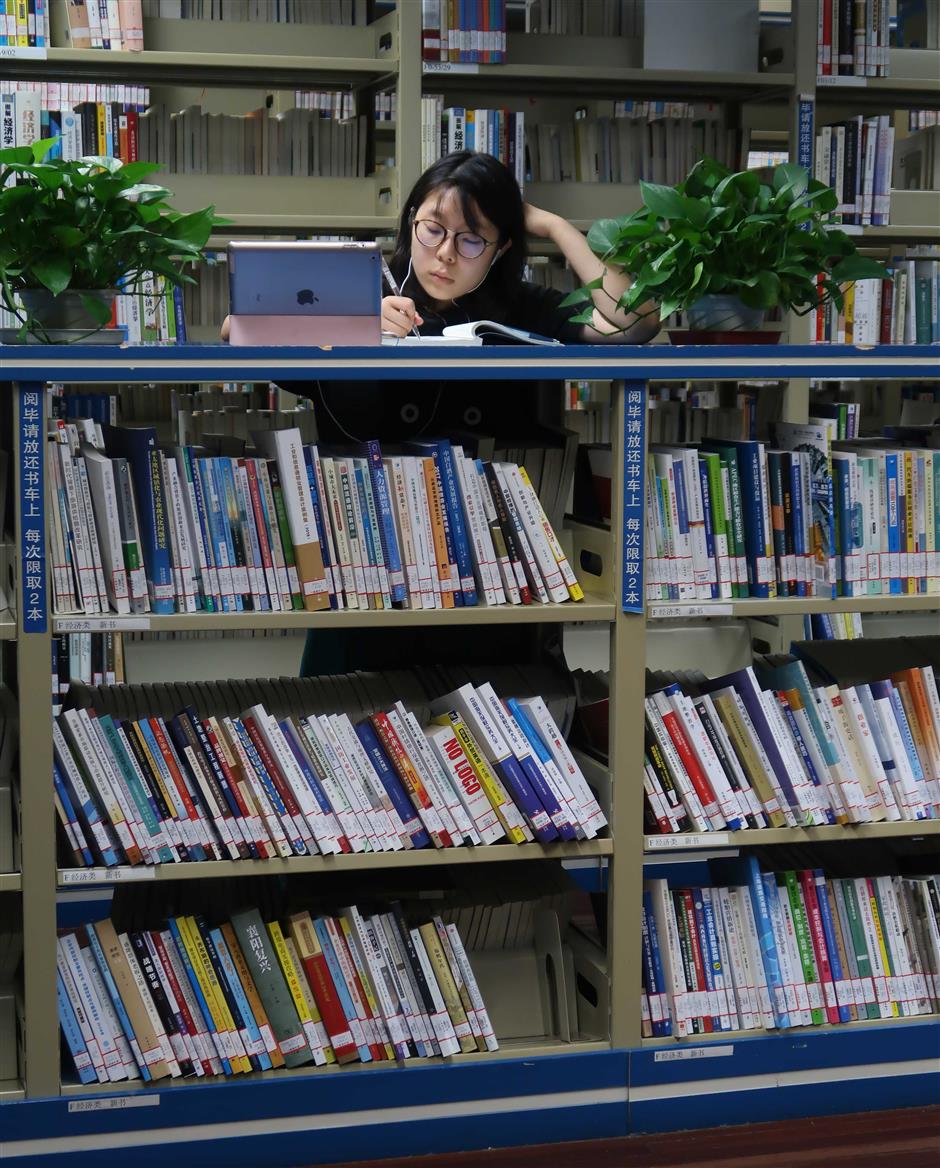
Many changes have occurred on the first floor since I visited last year. A Starbucks has replaced the original cafe, where a cup of latte was only about 20 yuan (US$2.9). Just inside the library, there is a digital screen showing real-time data, such as current number of patrons and books borrowed or returned.
A robot guide named Tu Xiaoling welcomes the readers at the entrance of the library, but it seemed to have fallen “asleep” when I was there.
The deposit fee of 100 yuan for a general library card is no longer required for local residents with a good credit rating.
What remains constant is the large wall of windows that admits daylight into the space. Bathed in sun, a mother seated on the floor of the atrium was reading a science book to her son.
Those suffering a bit of eye strain can gaze out into a courtyard where a statue of Confucius reminds us all of the value of wisdom. The shrubbery outside is trimmed to form the Chinese characters qiuzhi (求知), which mean “seeking knowledge.”
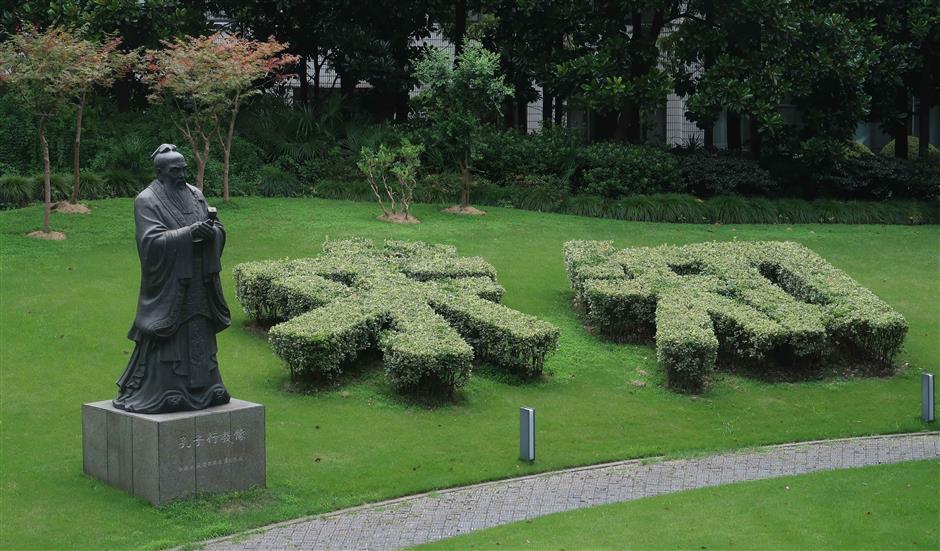
A statue of Confucius stands next to trimmed shrubbery forming the Chinese characters qiuzhi, which mean "seeking knowledge."
Arriving at the library at 9:30am, I walked up the stairs looking for a reading spot. It turns out I wasn’t the only person with that idea in mind. Available spots on the second and third floors were fully occupied. So I decided to do a bit of people-watching while I waited for a seat to become vacant.
People not only read here. They do all sorts of interesting things. One patron was sketching the outlines of a machine. An elderly woman was whispering the “Heart Satura” mantra with prayer beads. Many students were doing summer holiday homework in small groups. Some young people were working on laptops.
“The reason why I work here rather than at home is that there are printers available,” said an elderly man doing the machine design. “I have been coming to the library every day for almost 11 years.”
I met him again later in the ground-floor canteen. He had brought a can of beer from home and stuffed his ears with cotton balls to reduce noise.
Finally finding a vacant seat on the fourth floor, I saw Feng was typing an article on an old laptop, but I didn’t get the chance to talk to her until half past five in the afternoon, when she was reading digital newspapers in front of a big touch screen on the first floor.
She told me she is writing a novel about her parents, who conducted scientific research at Shanghai Jiao Tong University.
“My parents told me that they had moved from one place to another, but they never told me why,” she said. “So I come here to try to find the answer. Reading history books and cross-referencing times and places, I find that their moves coincided with major events like social movements and wars.”

An elderly man uses a magnifying glass to read a newspaper.

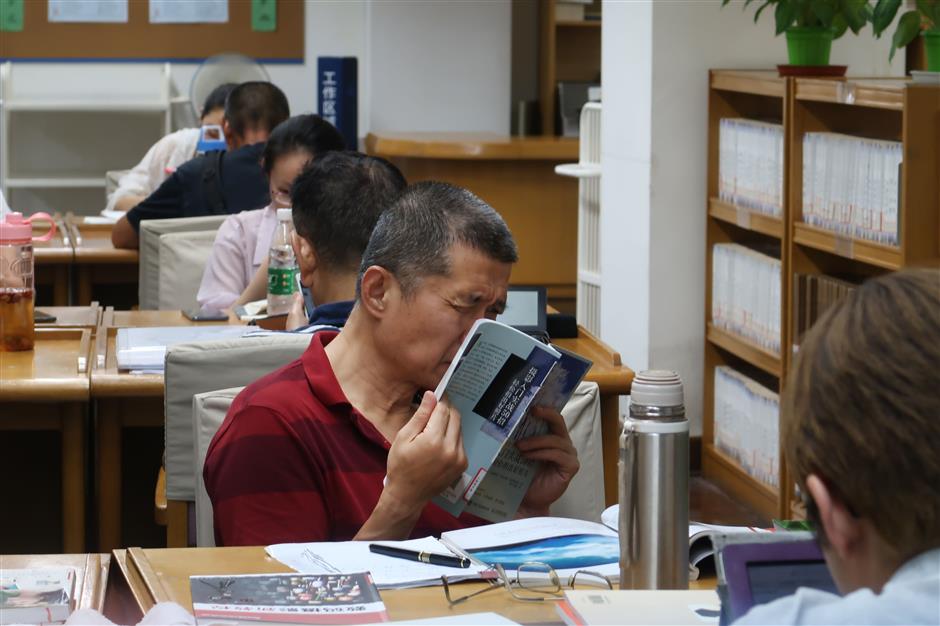
For many people like Feng, the library is the place where questions are answered and works are created.
Feng said she also visited libraries in Australia, where her daughter works as a teacher. Comparing libraries, she said that the biggest advantage of Shanghai Library is the canteen offering hot food.
“I always suggest my neighbors not to move away when they have such a treasure house of knowledge resources at their doorstep,” she said. “The library is like a sun shining down upon us.”
Feng said she prefers to do her work on the fourth floor where foreign books and journals are housed, including works about the United Nations, the World Expo 2010 Shanghai and German volumes donated by the Goethe Institute.
“There are fewer people on the fourth floor,” Feng noted. “Most of the patrons who go there can speak foreign language and thus are well-educated.”
Li Li’an, a Cuban who preferred to be called by her Chinese name, is doing her PhD in business administration at Donghua University. She said she prefers the fourth floor. She told me she first became acquainted with the library five years ago when her supervisor helped her and classmates apply for library cards.
“I studied here every day for five months last year,” Li said. “Now, I come only when I need to download or read the academic articles for my research. The fourth floor has such a nice environment, but you have to come early to grab an ideal spot for plugging in a computer.”
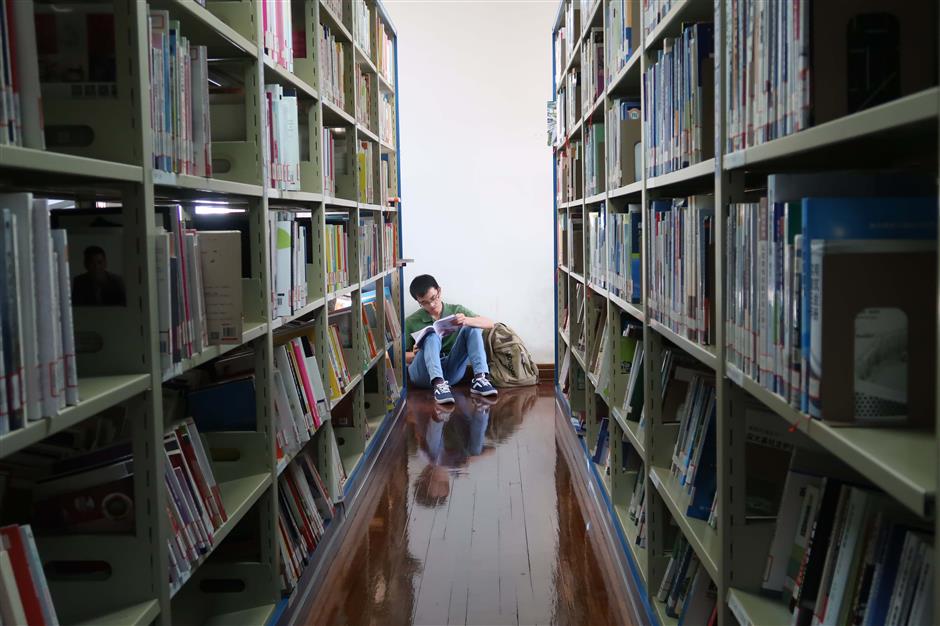
Unable to find a seat, a young reader parks on the floor.

Some of the inappropriate behaviors include eating and sleeping (below) in the reading rooms.

The staff of Shanghai Library are also bookworms. Many of them have their noses in a book whenever they get the chance. Sitting beside the turnstile of the fourth floor, a staffer surnamed Feng was reading an English novel, with the Chinese version alongside. She was probably trying to learn English.
“I’ve worked at Shanghai Library for almost 20 years,” she told me. “All kinds of people come here, from serious readers to weirdos. They all leave a deep impression on me, like the man who has been transcribing a blue-covered dictionary on art for three years and often works in the United Nations reading area.”
There is certainly no shortage of reading material. Shanghai Library holds 55 million volumes, including 1.7 million ancient books. Patrons can access the latter in the Ancient Chinese Documents Reading Room on the second floor. Strict rules are enforced to ensure preservation. For example, the rare books are not available on rainy days.
In one corner is the Genealogy Reading Room. I tried unsuccessfully to race my ancestors there, but the information available was too scant.
“Most of patrons in the room are elderly people. Some overseas Chinese pay special visits to the reading room to try to trace their roots. It’s onerous work with few rewards.
“The genealogy books haven’t been digitalized yet,” explained Shen Siyue, a staffer in the Genealogy Reading Room.
To maintain a quiet environment, Shanghai Library has installed several booths where people can receive or make phone calls without disturbing others. The booths, equipped with acoustic insulation, keeps noise levels down. But in reality, it’s still the responsibility of all patrons to maintain a quiet atmosphere.

Special booths are available for phone users so they don't disturb others.
During my stay, a young man played computer games in the morning and watched two films on his computer in the afternoon. I wondered why he bothered to come to the library for such activities.
“It is a pity that some people waste their time in the library, playing with mobile phones or computer games,” said the 69-year-old patron Feng. “They deprive people who really want to study of seats. Another impolite behavior is eating food in the reading rooms.”
Li Jiacheng complained that some patrons leave things in their seats, depriving others of using them, while they disappear for long periods of time.
“That needs to be corrected,” he noted.
Apart from its book collections, the library hosts exhibitions, forums and lectures, becoming as much a cultural center as a repository.
A new east branch of the library is under construction. Its progress is displayed on a digital screen on the first floor near the Catalogue Hall. It showed 720 days left to opening day when I was there.
If you go:
Opening hours: 8:30am-8:30pm (except holidays); 9am-4pm (on holidays)
Address: 1555 Huaihai Rd M.
Tel: 6445-5555
How to get there: Take Metro Line 10 to the Shanghai Library Station. Get out at Exit 3.
The opening hours of individual reading rooms may vary. For more information, check the official website (www.library.sh.cn/web/index.html).

Patrons use the library's Internet access catalogue to retrieve books.















